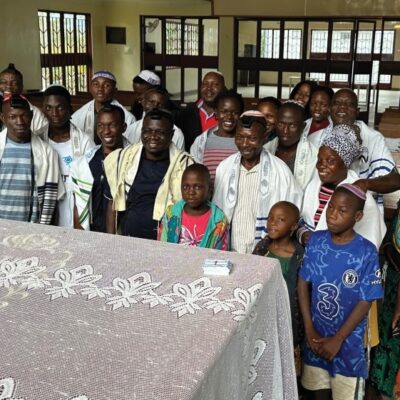CONFERENCE KERFUFFLE
Herzog offers compromise for antisemitism confab controversy: A separate meeting for Jewish leaders, without far-right politicians
Those who have already dropped out of the conference are not expected to attend the new gathering, a source familiar with the matter tells eJP

Israel's President Isaac Herzog. Askin Kiyagan/Anadolu Agency via Getty Images
As more and more Jewish figures drop out of the Israeli government’s upcoming antisemitism conference over the inclusion of far-right European politicians, Israeli President Isaac Herzog has offered a compromise — a gathering at his residence in Jerusalem for world Jewish leaders the day before the main event, granting them the option of participating in the conference without sharing a stage with the European parliamentarians.
This new meeting will be held next Wednesday evening and will occur alongside — but not formally part of — the Ministry of Diaspora Affairs and Combating Antisemitism’s “International Conference on Combating Antisemitism.”The president’s office said in a statement that the gathering “will feature prominent leaders from the Jewish world and include a panel of representatives from Jewish communities worldwide.”
A source familiar with the plans told eJewishPhilanthropy the guest list for this gathering has not been confirmed and that the attendees who have already canceled their participation in the conference are not expected to reverse their decisions and fly in for this meeting. This includes Anti-Defamation League CEO Jonathan Greenblatt, British Chief Rabbi Ephraim Mirvis, French philosopher Bernard-Henri Lévy, British antisemitism scholar David Hirsh, German antisemitism envoy Felix Klein and head of the Germany-Israel Friendship Association, German Volker Beck, among others. Though some of them, such as Greenblatt, may send video addresses, the source said, speaking on condition of anonymity.
Jewish leaders and German representatives began pulling out of the conference once it was announced that the attendees would include far-right European lawmakers such as Marion Marechal, a far-right French representative to the European Parliament and granddaughter of French politician and Holocaust denier Jean Marie Le Pen; Jordan Bardella, president of the far-right French National Rally party, a successor of Le Pen’s National Front; and Hermann Tertsch, a far-right Spanish member of the European Parliament. Bardella, whose party was publicly supported by Israeli Diaspora Affairs Minister Amichai Chikli in France’s recent election, is due to deliver a keynote address on the second day of the conference.
These politicians will not be invited to the president’s event, and Herzog will not appear at the second day of the conference, the source said.
The inclusion of the far-right politicians — without discussing the matter in advance with their countries’ Jewish communities — drew criticism even from those who opted to remain in the conference, such as former Jewish Agency Chairman Natan Sharansky.
“Those who continue to hold onto their antisemitic views obviously have no place in conferences against antisemitism. However, those who claim to have changed their views towards Jews certainly deserve to be heard,” Sharansky wrote on Facebook on Monday. “Alongside this, it is expected that the Minister of Diaspora, by virtue of his position, will organize such conferences in coordination with the communities in the Diaspora.”
For these far-right parties, official involvement in an Israeli conference on combating antisemitism provides them with a defense against claims of antisemitism in the future.
But critics argue that their involvement will provide ammunition to those claiming that the fight against antisemitism has been politicized and whitewashes these parties’ often fascist roots. To supporters, this embrace of Europe’s far right by Israel and segments of the Jewish world reflect a reshuffling of the geopolitical map and a more accurate reflection of who better represent the Jewish people’s allies in the fight against contemporary antisemitism, which they see as principally coming from Muslim immigrants and the far left.
“In an increasingly hostile world, the State of Israel is hungry for allies, but it must be disciplined in keeping some distance from those who do not share its values. Israel could listen more attentively to the advice of local Jewish communities and it should not offer the populist right, which has fascistic antisemitism in its heritage and amongst its support, an official Jewish stamp of approval,” wrote Hirsh, academic director of the London Centre for the Study of Contemporary Antisemitism, in a letter announcing his decision to withdraw from the gathering.
In any case, the controversy over the inclusion of these politicians has served as a distraction from the stated focus of the conference: combating antisemitism. Virtually all of the articles written about the conference so far have focused on who is and isn’t participating, rather than on the massive rise in the number of antisemitic incidents around the world post-Oct. 7, for instance.
Several of the Jewish speakers who are still listed as appearing at the International Conference on Combating Antisemitism have in the past warned against European far-right parties, including Sharansky and William Daroff, CEO of the Conference of Presidents of Major American Jewish Organizations.
The guest list of the antisemitism conference reflects the Israeli government’s recent embrace of far-right European parties, with which it previously maintained official distance due to many of their founders’ connections to Nazi Germany and more contemporary ties to neo-Nazi groups and Holocaust revisionism. Exceptions to this are German and Austrian far-right parties, whom Israeli Foreign Minister Gideon Sa’ar said Israel would still keep at arm’s length.
The antisemitism conference, which is scheduled to take place on March 26-27, is meant to serve as the culmination of next week’s “Diaspora Week,” when the Israeli government highlights the Israel-Diaspora relationship through a dedicated cabinet meeting, educational initiatives in schools and other gatherings throughout the country.
Ed. note: This article was updated after the president’s office clarified that the meeting was taking place separately from the Ministry of Diaspora Affairs and Combating Antisemitism’s conference, and not as a part of it as it originally stated.













